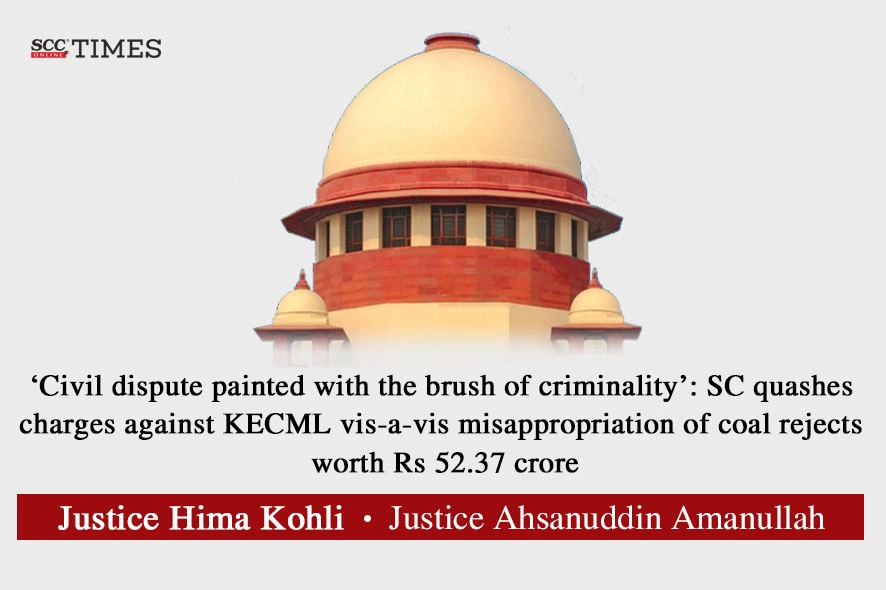Supreme Court: While considering the instant appeals challenging the decision of Special Judge, CBI rejecting their application for seeking discharge in the proceeding to frame charges against them along with the other co-accused, for having entered into a criminal conspiracy aiming to facilitate illegal sale of coal rejects by GCWL that were generated during washing of coal and for gaining undue pecuniary advantage; the Division Bench of Hima Kohli* and Ahsanuddin Amanullah, JJ., reproached the CBI for “Embarking on a roving and fishing inquiry on the strength of the Audit Report of the CAG and then working backwards to sniff out criminal intent against the appellants”.
The Court found that the instant matter had the underpinnings of a civil dispute premised on a contract between the parties, breach of which could at best have led to determination of the contract or even the underlying lease deed; however, the same had been “painted with the brush of criminality without any justification”. The Court strictly pointed out that criminal intent had been threaded into the dispute by the respondent-CBI via misinterpreting the clauses of the agreements governing the parties and by heavily banking on the observations made in the Audit Report of the CAG that has not attained finality till date.
Background: In 2002, a Joint Venture Agreement (JVA) was executed between Karnataka Power Corporation Limited (KPCL) and Eastern Mineral and Trading Agency (EMTA) for a period of 25 years for the development of captive coal mines and supply of coal to the Thermal Power Plant operated by KPCL. KPCL was allocated three coal blocks by the Government of India under the Western Coalfield Limited command area situated in the State of Maharashtra for the development/operation of coal mines dedicated to feeding Bellary Thermal Power Station (BTPS). The joint venture agreement gave rise to a joint venture company KEMCL.
On 10-11-2003, the Ministry of Coal (MoC) vide a letter, allocated three coal blocks to KPCL for power generation for the proposed Thermal Power Station at Bellary, Karnataka. On December 2004, the MoC, issued a letter to KECML approving the Mining Plan submitted by it for the Baranj Open Pit Project under Section 5(2)(b) of the Mines and Mineral (Development & Regulation) Act, 1957. As per the appellants, this Mining Plan did not contain any provision contrary to the JVA regarding the coal rejects. KECML was required to dispose of the rejects as stipulated under Clause 5(2)(b) of the JVA. The JVA also stipulated a Fuel Supply Agreement between KPCL and EMTA for supply of washed coal, which was executed in 2007. However, the actual mining and coal production could be commenced by KECML only in September 2008 on account of a litigation initiated by Central India Power Company against the MoC in relation to the coal block allocated to KPCL.
As per the JVA, the appellants had to establish a coal washery at the pithead to supply coal of the required specification for the consumption of BTPS, hence they entered into a MoU with Gupta Coalfields and Washeries Limited (GCWL). Around 2009, the CIMFR visited Integrated Baranj Open Cast Mines, collected 100 MT of coal for testing and furnished a Detailed Washability Report stating that the rejects did not contain any useful c.v. as the GCV of the rejects was 1094 Kcal/Kg and the useful heat value was negative.
After mining for about two years in terms of the original Mining Plan, KPCL decided to increase the capacity of BTPS from 2.5 Mty to 5 Mty. In December 2010, the appellants addressed a letter to the MoC for seeking approval of the revised Mining Plan. At that stage, a new technology for utilization of the rejects for its carbon value was introduced i.e., Fluidised Bed Combustion. Via letter dated 24-8-2011, the MoC approved the revised Mining Plan. While the Terms of Reference was granted by the MoEF& CC, the mandatory public hearing required to obtain environment clearance could not be conducted since Supreme Court passed an order in 2014 deallocating all captive coal blocks. Prior to that, due to disputes between KECML and GCWL, coal washing was stopped at GCWL washery w.e.f. 22-5-2012.
The Office of Coal Controller called upon the KECML to furnish details in terms of the prescribed formats in respect of the production, stock, dispatch of coal to the washery etc., in December 2012. KECML furnished a reply stating that the quality of the rejects was so poor that no records were maintained regarding its utilization. However, the rejects were used to fill up low land area of siding and road between coal blocks to the washery and for pit dumping near the washery.
Audit Objections by CAG and CBI Inquiry: On 31-10-2013, the Office of the Principal Accountant General (E&RSA), Karnataka raised an audit inquiry on KPCL about non-utilization of the washery rejects and the resultant undue benefit of Rs 53.37 crores to a private company.
The CAG in its audit enquiry noted that KECML/EMTA disposed of the coal rejects without transferring the revenue to KPCL. Despite clarification issued by KECML, CAG in its Audit Report for the year ending March 2013, observed that coal rejects worth Rs 52.37 crore had been misappropriated by KECML and GCWL on account of the inaction on the part of the KPCL.
In the meantime, in pursuance of some irregularities committed in the allocation of coal blocks under the ‘Government Dispensation’ category, a Preliminary Inquiry was registered by the Superintendent of Police, CBI on 28-9-2012. The FIR against the appellants was registered by the CBI on 13-3-2013 under S. 120-B r/w Sections 409 and 420, IPC and under S. 13(2) r/w 13(1)(d) of the PC Act, 1988 alleging substantive offences against the appellants and other co-accused.
Around 2019, a chargesheet was finally filed by the CBI against 14 persons/entities alleging that they had illegally disposed of the coal rejects. On 1-9-2021, the appellants filed an application before the Single Judge under S. 227 r/w S. 239 of CrPC. By the common impugned order dated 24-12-2021, the said application was dismissed, and charges were framed against the appellants on 3-3-2022, resulting in filing of the instant appeals.
Major Contentions: Counsels for the appellants contended that original Mining Plan which was submitted by KECML and was approved by the MoC in 2004, did not contain any specific provision relating to how the rejects were to be disposed of nor did the allocation letter issued by the MoC to KPCL state anything in this regard. It was further submitted that KPCL did not have any right over the rejects generated during the process of mining and that CBI ignored Karnataka High Court’s decision that upheld this stance. The appellants argued that CBI had solely relied on the Report of the CAG of 2013 to launch its prosecution in 2015.
Per contra, the CBI contended that appellants have unduly placed heavy reliance on the original Mining Plan. CBI argued that absence of any plans mentioned in the Mining Plan to deal with the rejects would not exonerate the appellants. CBI also refuted the appellant’s argument that the case was triggered by the CAG report, stating that CBI had conducted its own independent enquiry into the allegations.
Court’s Assessment and Findings: Perusing the trajectory of the matter which began with a Joint Venture Agreement in 2002, the Court clarified that challenge has been laid to the impugned orders directly before the Supreme Court in the light of the directions issued in M.L. Sharma v. Principal Secretary, (2014) 9 SCC 614, wherein directions were issued that the Supreme Court alone shall have the jurisdiction to entertain cases relating to coal block allocation across the country, in particular, cases where the parties seek a stay of the investigation/trial in a matter relating to coal.
The Court further noted that the origin of the investigation coal block allocation also has its origin in the directions issued in M.L. Sharma case (supra). The Court stated that the coal allocation in favour of KPCL was also a subject matter of investigation, but nothing untoward was noticed in that. The JVA between KPCL and KECML also withstood the test of scrutiny. As a result, allocation of coal blocks made in favour of KPCL were not interfered with.
Considering whether the CBI primarily relied on the CAG Report to launch a prosecution against the appellants, the Court noted that the records produced by the CBI revealed that on basis of the Source Information Report (SIR) pertaining to some irregularities in the allocation of coal blocks under the Government Dispensation Category allegedly in connivance with public servants, the matter was taken up by CBI for verification. The notings in the file stated that it was not possible to verify the allegations discreetly. Therefore, the SIR was directed to be registered as a Preliminary Enquiry (PE).
The Court pointed out that the records falsify the suggestion made by the CBI that there was a SIR disclosing irregularities in the JVA executed between KPCL and KECML. The Court found that stand of CBI that PE-5 was registered well before 2013 Audit Report of the CAG and originated independently thereof, was also factually misleading because CBI’s own record showed that the scope of enquiry in respect of PE-5 registered on 28-9-2012, was entirely different and had no relationship with the JVA and other agreements executed by KPCL and KECML. “The entire focus of the said PE’s was on the larger issue of irregularities in the allocation of coal blocks through the Government dispensation route. In this background, the respondent—CBI cannot be heard to state that CBI was independently investigating the matter at hand well before 2015 or the Audit Report of the CAG of 2013 was not the trigger point for commencing the investigation”.
Vis-a-vis sanctity of an Audit Report in law, the Court taking note of relevant provisions in Comptroller and Auditor General’s (Duties, Powers and Conditions of Service) Act, 1971; Article 149 of the Constitution and several precedents, stated that the recommendations of the Public Accounts Committee are premised on the response that is received from the concerned Ministries and the Action Taken Reports, which include the replies furnished by the Government and the comments of the PAC to the said replies. Finally, it is for Parliament to comment on the CAG’s Report after it receives the report of the PAC. The Court further pointed out that merely because the CAG is an independent constitutional functionary, it does not mean that after receiving a report from it and on the PAC scrutinizing the same and submitting its report, the Parliament will automatically accept the said report.
The Court pointed out that in the instant matter, Audit Report of the CAG has not been tabled before the Parliament for soliciting any comments from the PAC or the respective Ministries. Therefore, the views taken by the CAG that tremendous loss had been caused to the public exchequer on account of the coal rejects being disposed of by the KPCL and KECML remains a viewpoint but cannot be accepted as decisive.
The Court thus found that CBI had largely relied on the findings and the conclusions drawn in the Audit Report of the CAG to launch the prosecution against the appellants on an assumption that the said Report has the seal of approval of the Parliament and has attained finality, which was not the case.
Regarding absence of strategy in the Mining Plan to dispose of coal rejects, the Court pointed out that the appellants contentions were validated by the reply furnished by the Minister of State, MoC, in the Lok Sabha, wherein it was stated that Government had not framed any National Policy for exploitation of coal rejects and the same was still under consideration. Therefore, it was left to KPCL and KECML to devise a satisfactory and safe method to dispose of the coal rejects. This was done in terms of Article 5(2)(b) of the JVA. Hence the Court did not find any irregularities.
Vis-a-vis the requirement for KECML to account for the coal rejects, the Court noted that agreements governing the parties required KECML to dispose of the rejects safely. KECML was not required to account for the coal rejects to KPCL. KPCL itself understood the clauses in the JVA and the FSA to mean the same and it was satisfied with the way KECML was discharging its obligations under the agreements till Audit Objections were raised by the CAG in October 2013.
Regarding High Court’s inherent power under S. 482 CrPC and Supreme Court’s extraordinary power under Article 136 of the Constitution, and its significance for the instant appeals, the Court stated that owing to ruling in M.L Sharma case (supra), the route to invoke S. 482 was closed for the appellants and they were left with only one chance of directly invoking Article 136 of the Constitution. The Court pointed out that the CBI cannot be heard to urge that since a Chargesheet was already filed and charges framed, the appellants should be left to take all the pleas available to them before the Special Judge, CBI during the trial. “Such an approach does not commend itself to this Court in the facts and circumstances of this case”.
Concerning application of mind at the stage of S. 227, CrPC, the Court relying on established precedents, noted that in exercising his jurisdiction under S, 227, the Judge cannot act merely as a Post Office or a mouthpiece of the prosecution, but must consider the broad probabilities of the case, the total effect of the evidence and the documents produced before the Court, any basic infirmities appearing in the case and so on. This, however, does not mean that the Judge should make a roving enquiry into the pros and cons of the matter and weigh the evidence as if he was conducting a trial.
The Court found that Special Judge, CBI did not consider the instant matter keeping in mind the parameters laid down under S. 227, CrPC.
While concluding the matter, the Court clarified that that it has consciously elected to confine itself only to those aspects which would be sufficient to arrive at a prima facie view that the allegations levelled against the appellants have pre-dominant contours of a civil dispute and does not have the makings of a criminal offence. The Court thus declined to go into the nitty gritties of the documents/evidence, or the contrasting data produced by the parties to test their probative value.
With the afore-stated assessment, the Court berated the CBI for trying to weave criminality in a civil dispute and therefore, the impugned orders of the Special Judge, CBI dt. 24-12-2021 and 3-3-2022, were quashed.
CASE DETAILS
|
Citation: Appellants : Respondents : |
Advocates who appeared in this case For Petitioner(s): For Respondent(s): |
CORAM :







